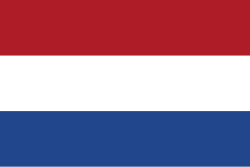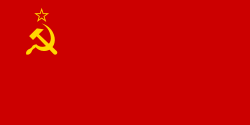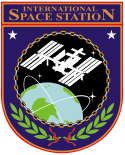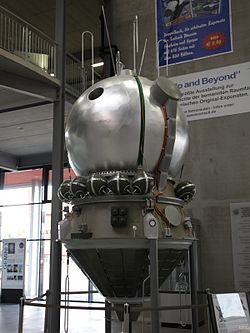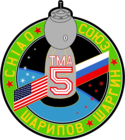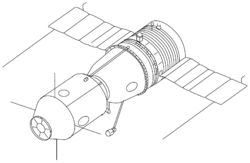Sojuz TMA-4
| Sojuz TMA-4 (Союз ТMA-4) | |||
 | |||
| Beställare | Roskosmos | ||
|---|---|---|---|
| Modell | Sojuz-TMA | ||
| Tillverkare | RKK Energia | ||
| Operatör | Roskosmos | ||
| Anrop | Altair | ||
| Färdens tid | 187 dagar, 13 tim, 22 min | ||
| NSSDC-ID | 2004-013A[1] | ||
| Uppskjutning | |||
| Startplats | LC1 Bajkonur | ||
| Start | 19 april 2004, 03:19:00 UTC | ||
| Raket | Sojuz-FG | ||
| Landning | |||
| Landningsplats | 90 km N om Arkalyk, Kazakstan | ||
| Landning | 24 oktober 2004, 00:35:00 UTC | ||
| Omloppsbana | |||
| Varv | 2 950 st[2] | ||
| Apogeum | 252 km | ||
| Perigeum | 200 km | ||
| Banlutning | 51,7° | ||
| Besättning | |||
| Start | Gennadij Padalka (2) Michael Foale (6) André Kuipers (1) | ||
| Landning | Gennadij Padalka Michael Foale Jurij Sjargin (1) | ||
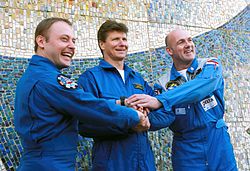 Från vänster: Fincke, Padalka, Kuipers | |||
| Dockning | |||
| Rymdstation | ISS | ||
| Dockning | 21 april 2004, 05:01 UTC | ||
| Port | Zarja, nadir | ||
| Ur dockning | 23 oktober 2004, 21:08 UTC | ||
| Kronologi | |||
| |||
Sojuz TMA-4 (ryska: Союз ТMA-4) var en flygning i det ryska rymdprogrammet. Flygningen gick till Internationella rymdstationen. Farkosten sköts upp från Kosmodromen i Bajkonur med en Sojuz-FG-raket, den 19 april 2004. Man dockade med rymdstationen den 21 april 2004.
Man lämnade rymdstationen den 23 oktober 2004. Några timmar senare återinträdde den i jordens atmosfär och landade i Kazakstan.
I och med att farkosten lämnade rymdstationen var Expedition 9 avslutad.
Referenser
- ^ ”NASA Space Science Data Coordinated Archive” (på engelska). NASA. https://nssdc.gsfc.nasa.gov/nmc/spacecraft/display.action?id=2004-013A. Läst 29 februari 2020.
- ^ Manned Astronautics - Figures & Facts Arkiverad 4 mars 2016 hämtat från the Wayback Machine., läst 9 oktober 2016.
| |||||||||||||||||||||||||||||||||||||||||||||||||||||||||||||||||||||||||||||||||||||||||
| |||||||||||||||||||||||||||||||
| ||||||||||||||||||||||||||||||||
Media som används på denna webbplats
Rotated and color enhanced version of original (ISS013-E-48788 (6 July 2006) --- The Space Shuttle Discovery approaches the International Space Station for docking but before the link-up occurred, the orbiter went through a series of inspection photos by station crew to inspect the vehicle for any damage to its Thermal Protection System. This was known as the Rendezvous Pitch Maneuver and was implemented after the Columbia Disaster in 2003. The Leonardo Multipurpose Logistics Module can be seen in the shuttle's cargo bay. Discovery docked at the station's Pressurized Mating Adapter 2 at 9:52 a.m. CDT, July 6, 2006.)
Backdropped by a blue and white Earth, this close-up view features the Soyuz TMA-6 spacecraft approaching the International Space Station (ISS). Onboard the spacecraft are cosmonaut Sergei K. Krikalev, Expedition 11 commander representing Russia's Federal Space Agency; astronaut John L. Phillips, NASA ISS science officer and flight engineer; and European Space Agency (ESA) astronaut Roberto Vittori of Italy. The Soyuz linked to the Pirs Docking Compartment at 9:20 p.m. (CDT) on April 16, 2005 as the two spacecraft flew over eastern Asia. The docking followed Friday’s launch from the Baikonur Cosmodrome in Kazakhstan.
In this illustration, a SpaceX Crew Dragon spacecraft approaches the International Space Station for docking. NASA is partnering with Boeing and SpaceX to build a new generation of human-rated spacecraft capable of taking astronauts to the station and expanding research opportunities in orbit. SpaceX's upcoming Demo-1 flight test is part of NASA’s Commercial Crew Transportation Capability contract with the goal of returning human spaceflight launch capabilities to the United States.
Författare/Upphovsman: Pascal (Flickr user: pasukaru76), Licens: CC0
Vostok spacecraft replica at the Technik Museum Speyer, Germany.
Soyuz TMA-4 Patch
Soyuz-TM spacecraft. Compare the antennas on the orbital module to those on Soyuz-T. Differences reflect the change from the Igla rendezvous system used on Soyuz-T to the Kurs rendezvous system used on Soyuz-TM.
Soyuz TMA-3 crew patch, designed by Luc van den Abeelen.
Apollo-Soyuz Test Project (ASTP) Soyuz. The APAS-75 docking unit is located at left.
The Soyuz TMA-04M spacecraft is seen after being rolled out by train to the launch pad at the Baikonur Cosmodrome in Kazakhstan, May 13, 2012. The launch of the Soyuz spacecraft, with Expedition 31 Soyuz Commander Gennady Padalka, Flight Engineer Sergei Revin of Russia and NASA Flight Engineer Joe Acaba, is scheduled for 9:01 a.m., May 15 (Kazakhstan time).
This Soyuz TMA-5 patch was designed by Alex Panchenko:
"I've started design works of patches for Soyuz TMA-5 (ISS-10 flight) back in July 2004, when first sketches - drawings made in Starbucks coffee and later presented them for approval to Soyuz commander S. Sharipov. It was still not clear who is going to be third crew member of Soyuz and in this case I was preparing for Soyuz TMA-5 flight design in two variants (with name of Polonsky and with name of Shargin - both candidates on third seat in Soyuz).
During design work with Soyuz TMA-5 patch my idea was to present Soyuz panels as symbolic flags of Russia and United States, and base of design is a window view outside. Crew names are in the same order as their actual seats inside Soyuz. Commander S. Sharipov in center, L. Chiao on the left from commander and Y. Shargin on the right side."
Astronaut Edward M. (Mike) Fincke (left), NASA International Space Station (ISS) science officer and flight engineer; cosmonaut Gennady I. Padalka (center), Russia’s Federal Space Agency Expedition 9 mission commander; and European Space Agency (ESA) astronaut Andre Kuipers (right) of the Netherlands pose for a group photo after the flag raising ceremony at the Cosmonaut Hotel, Baikonur, Kazakhstan.
Soyuz-A manned spacecraft concept (1963). It was to have been part of the Soyuz A-B-C circumlunar complex.








